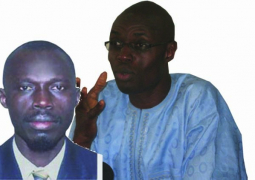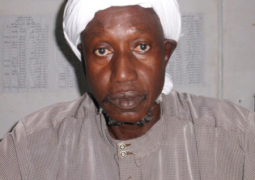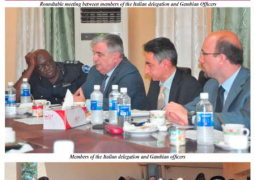Reminding ourselves that the 11th edition of the National Youth Conference and Festival hosted by Lower River Region from the 12th through 21st December 2014 was held under the theme “Youth Entrepreneurship and Sports Development”
Understanding the implications of HIV/AIDS, teenage pregnancy/early marriage, and other sexual and reproductive health challenges on the productivity of young people, especially girls and young women
Reaffirming our commitment to the development of The Gambia; and Encouraged by the government of The Gambia for placing the youth at the centre of the country’s development as enshrined in the development blueprints of the PAGE and Vision 2020
Acknowledging with appreciation the support of the Government of The Gambia and the contribution of the private sector, non-governmental organisations and development partners in their efforts directed at building a better and stronger Gambia with the effective participation of young people
Committing ourselves to the preservation of our moral and cultural norms and values as well as the promotion and maintenance of peace and stability of the country
Concerned however by the fact that intervention areas of projects in agro business and green economy are not reflecting the reality of the felt needs of the youth; that the youth are not effectively involved from the planning through evaluation stages of agricultural projects; and that, capture-fisheries (deep water fishing), is neglected compared to, culture-fisheries (Aquaculture), in the FASDEP project
Alarmed that recurrent crop failure resulting from climate change and other perennial challenges, such as pest and wildlife invasion, are blighting agricultural development; that seasonal farming produces low productivity; and that low skills, lack of availability of modern farming implements and access to land ownership for agriculture purpose by youths remains a challenge
Admitting with regrets that differently able persons generally lack access to technical and vocational education as training centres, save PIA, do not put in place such vital facilities as rams, braille and sign language interpreters; that vital information on TV is received by the hard of hearing through secondary sources
Nothing further that the tax regimes in place discourage young people from venturing in entrepreneurship; and that high interest rates and inadequacy of micro credit support to youth impede the development of youth enterprise development
Observing with concern that the Gambian youth in entrepreneurship and livelihoods skills are not adequately patronized; and that youths of The Gambia are hardest hit by the high unemployment situation with 38 percent of them unemployed and a good percent of them underemployed, as outlined in the National Human Development Report 2014
Noting that The Gambia’s educational system is academic bias; and that the technical and vocational education in The Gambia has to a large degree failed to supply the job market with well-equipped youth
Recognising that the perception of youth in particular and Gambian society in general towards entrepreneurship and livelihood skills is negative
Aware that the structures in place in school, regional and national levels for varied sporting disciplines are inadequate and ill-equipped; and that these sporting disciplines are faced with inadequate capacities, competencies and attention in the schools
Aware also that marketing of sports is inadequate; that some other sports are given far more prominence than others in the media; that the media needs to diversify its reportage of the sports events
Noting that there is wide regional disparities between rural and urban Gambia in terms of provision of sports facilities and opportunities
We the conference delegates from national youth organisations, regional governments and municipalities, and differently able organisations, at the National Youth Conference and Festival 2014, held in Lower in Lower River Region, hereby agree on the following resolutions:
1.The government of the Gambia, through MOA, MOF, MOYS direct the FASDEP project to promote capture-fisheries (deep water fishing) by empowering Gambian youth to venture into fisheries, as fisheries resources in the Gambia’s Exclusive Economy Zone (EEZ) is sufficient enough to attain food self-sufficiency in the country.
2.The ministry of Agriculture, in collaboration with MoYS as well as development partners should encourage effective involvement and participation of youth in the planning through to the final phases of projects and programs.
3.The government of the Gambia, through MoA and other stakeholders should establish Crop Insurance Scheme; and through MOA, Department of Water Resources expand and provide irrigation system in other regions to increase productivity.
4.The government of the Gambia through MOYS, MOA, MoLRG and development partners, such as FAO, should provide training opportunities, modern farm implements and access to land ownership to youths
5.The government of The Gambia, through the ministry of Justice should pass into law a disability Act that would oblige technical and vocational centres to make their services accessible to differently able persons; and oblige GRTS to introduce sign language interpreters.
6.The government of The Gambia, through the ministry of youth and sports, in collaboration with ministries of Trade, Employment and Regional Integration, and Finance and Economic Affairs to establish a policy framework that would grant to emerging Gambian youth entrepreneurs a three-year tax holiday.
7.As with the Sport Development Fund, we request that the government of the Gambia, through the ministry of Youth and Sports to transfer the management of the Youth Development Fund to National Youth Council, under the supervision of MoYS.
8.The government of the Gambia, in collaboration with the Gambia Public Procurement Authority, and the National Assembly should establish a policy that would require government institutions to give priority to Gambian businesses in awarding contracts
9.The government of the Gambia, through MoTIE should introduce a quota system that would require all employers, including the private sector, to allocate a certain percentage of job position to Gambians.
10.The government of the Gambia, through the ministry of Basic and Secondary Education as well as higher education ministry should introduce and encourage the learning and teaching of entrepreneurship and technical and vocational subjects from basic through senior secondary levels; revitalise secondary technical schools; and provide career counseling services at basic and secondary levels to guide students choose professions that fit their talents.
11.The government of the Gambia, through the ministry of higher education should empower and encourage the National Training Authority to implement the curriculum that NTA developed for vocational and technical centres.
12.The National Youth Council, in collaboration with national youth organisation should embark on a massive sensitization programme to encourage and embolden youth to pursue careers in entrepreneurship and livelihoods skills.
13.The government of the Gambia, through the ministry of Finance, in collaboration with the National Assembly, should increase subvention of satellite institutions under the MoYS, namely NYC, NEDI, PIA and NYSS
14.The NYC should strengthen partnership with government ministries, departments and parastatals as well as development agencies to be able to influence policies and programs
15. The government of The Gambia, through the Ministry of Youth and Sports, Ministry of Finance and Economic Affairs, in collaboration with various national sports organisations as well as development partners should establish in every region a multipurpose sports centre
16.The government of The Gambia, through the ministry of Youth and Sports should seek to promote coverage of all sporting disciplines by the Gambia media institutions, particularly the state broadcaster, GRTS.
17.The government of The Gambia through the Ministry of Youth and Sports, and Ministry of Higher Education, Research, Science and Technology, should establish a sports institute
18.The government of Gambia, through MoBSE, MoHERST, should allocate quality term time to physical education and strengthen school sports by enhancing the competencies and capacities of sports teachers to be able to teach students in a wide range of sporting disciplines, including differently able sports
19.The Government of The Gambia in collaboration with the National Assembly should separate the youth ministry from sports
20.While supporting the position of the National Sport Council in promoting and safeguarding the Gambian brand wrestling, we request that the NSC and all stakeholders concern allow all styles of wrestling in the spirit of entrepreneurship development
22.The government of the Gambia, through MOF, MOBSE, and MOHERST should collaborate with development partners to incorporate the teaching and learning of fisheries in schools such that young people would change perception and develop appreciation of that important socio-economic activity
23.The nominated youth representative at the National Assembly should be concerned by and play active participation in the affairs of the youth, and such nomination should come from the recommendation of the NYC, in consultation with national youth organisations; and in a similar regard, youth representatives in local government councils and municipalities should be based on the recommendation of the regional youth councils, in consultation with NYC
24.The government of the Gambia should split ministry of Youth from Sports, and bring culture and employment under the youth ministry, such that the name shall henceforth be Ministry of Youth, Employment and Culture, while sport will be Ministry of Sports and Recreation
25.The National Sport Council, in collaboration with national sports associations and federations should ensure that the principles of good governance, accountability and transparency are adhered to in sports administration
26.The young people of the Gambia should endeavour to repay loans to ensure the sustainability of micro credit schemes set up for them
27.Local government authorities should take up the challenge to create recreational centres in every major town in The Gambia
28.The National Youth Council, in collaboration with local government authorities should create youth farms in every region
Signed by all Regions and Municipalities and heads of conference delegation:
Sarjo Sarr, Head of Delegation – Kanifing Municipality
Fatou Ndure, Head of Delegation – Banjul
Mamudou Kuyateh, Head of Delegation – West Coast Region
Binta S. Njie, Head of Delegation – North Bank Region
Kadijatou Jabbie, Head of Delegation – Upper River Region
Omar Jammeh, Head of Delegation – Central River Region
Alhasan Bah, Head of Delegation – Lower River Region
Samba Bah, Representatives of National Youth Organizations
Lamin Darboe, Executive Director National Youth Council
Alagie Jarju, Chairperson – Conference Sub - Committee
Adopted by delegates of the 11th National Youth Conference and Festival on Thursday 18 December 2014, at 20:50 pm at Jenoi Agricultural Training Centre, Lower River Region.




